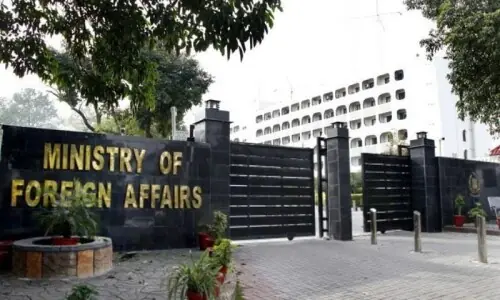ISLAMABAD: Foreign Minister Shah Mahmood Qureshi on Wednesday wrote letters to the UN Security Council and the UN Secretary General, drawing their attention to “unlawful steps” being taken by India after the annexation of the disputed region of Kashmir to strengthen its “colonial hold” on the territory.
These actions include changes to the demographic structure and electoral boundaries in the occupied territory for “further marginalisation of Kashmiri Muslims” and “suppressing their demand for freedom”.
“All such measures by India in IIOJK [Indian Illegally Occupied Jammu and Kashmir] are violations of international law, including the UNSC resolutions and 4th Geneva Convention, and, are ipso facto, legally and materially, null and void,” he maintained.
Mr Qureshi also pointed to India’s role in “planning as well as promotion and financing of terrorist activities” against Pakistan, including the recent bombing in Lahore.
He urged the Security Council to demand that India halt its terrorist and subversive campaign against Pakistan.
“This latest letter from the foreign minister is in continuation of Pakistan’s regular communications since August 2019 to keep the United Nations fully apprised of the grave situation in IIOJK, and to remind the Security Council of its responsibility to secure a peaceful and just settlement of the Jammu and Kashmir dispute in accordance with its resolutions,” FO spokesman Zahid Hafeez Chaudhri said.
Meanwhile, while addressing a seminar at the Islamabad Policy Research Institute on the occasion of second anniversary of annexation of Occupied Jammu and Kashmir by India, Mr Qureshi said normalisation with India could not be done at the cost of people of Kashmir.
“Pakistan wants to shift focus from geo-politics to geo-economics. We want peace with India but not at the expense of the Kashmiris,” he emphasised.
The paradigm shift in Pakistan’s foreign policy towards geo-economics emerged earlier this year at a time when backchannel diplomacy with India yielded restoration of ceasefire at the Line of Control.
However, the process stalled soon afterwards as India failed to take steps towards restoration of Kashmir’s statehood by revoking its actions of Aug 5, 2019.
Mr Qureshi reiterated Pakistan’s call for India to “rescind its unilateral actions and all related instruments of oppressions and state terrorism”.
He said peaceful settlement of the dispute would “weaken the extremist narrative”, unlock region’s potential and eliminate the threats to regional and international peace and security.
“We hope the Indian leadership will prefer statesmanship over populism,” he said.
Recalling the human rights violations the people of Occupied Jammu and Kashmir being subjected to, the minister said they had been languishing “in the largest concentration camp on the planet” for the past two years, where they had been even denied regular or emergency medical facilities.
“Even Covid-19, which has generated unprecedented empathy in the human race has done nothing to bring even an iota of relief to the Kashmiris,” the minister deplored.
He said young men were being disappeared by Indian security forces and a process of demographic engineering was under way in the valley.
Noting the worsening situation, Mr Qureshi said: “India is trying to eliminate Kashmiris altogether.”
Recalling the successes of the Pakistan government in highlighting the plight of Kashmiris at the international forums, the foreign minister said the Security Council had discussed the Jammu and Kashmir dispute thrice since August 2019 and the people around the world were gradually realising that “beyond the smokescreen of Indian sophistry, lies Kashmiris’ perpetual nightmare”.
He took on the critics of the government’s Kashmir policy, saying “insinuations or allegations questioning our sincerity are simply malicious”.
OIC delegation
A 12-member delegation of the Independent Permanent Human Rights Commission (IPHRC) of the Organisation of Islamic Cooperation (OIC) will visit the LoC to monitor the on-ground situation, adds APP.
The Foreign Office said that during the visit the IPHRC delegation would travel to Muzaffarabad and the LoC, and interact with Kashmiri leadership, refugees from IIOJK and victims of Indian atrocities.
The FO mentioned that the IPHRC’s visit from Aug 4-9 coincided with the completion of two years of India’s illegal steps of Aug 5, 2019, which it had taken in flagrant violation of the UN Security Council Resolutions on the Jammu and Kashmir dispute.
The visit is part of the IPHRCs mandate to monitor the deteriorating humanitarian and human rights situation in IIOJK, especially as a result of the spate of Indian illegal actions since Aug 5, 2019.
Published in Dawn, August 5th, 2021



































